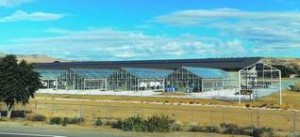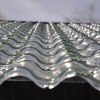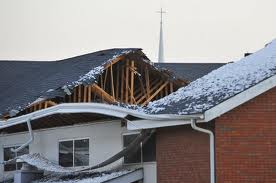Archive for October, 2010
Nevada University Greenhouse Goes Solar
The University of Nevada, Reno, installed 3,000 square feet of solar panels to its Agricultural Experiment Station off Valley Road. Installing 171 solar panels on top of the greenhouse. Estimated to save approximately $6,300 a year in energy costs.
Opened in 2008, the research facility includes bio fuels and other renewable energy research and experiments. The panels were placed on the roof of field lab’s greenhouse complex. The greenhouse was built with additional supports in anticipation of future solar panels.
The Department of Energy gave the university a $951,000 sustainability grant. The college also received $150,000 in rebates from NV Energy. A Combination of solar rebates and drop in the cost of materials pushed the project forward.
Estimated to generate about 60,000 KW of energy per year. The panels will generate electricity during peak hours saving money and lowering energy bills. Another building on campus, Joe Crowley Student Union has had solar panels and has been generating energy since 2008. The new panels are another step towards a more sustainable campus.
Students Learn Roof Repair
The carpentry class at Tantasqua Regional High School in Fiskdale, Mass., along with their teacher Stephen Mucha, re-shingled the roof of an 1840’s cooper shop.
Brad King, director of facilities and grounds at Old Sturbridge Village, where the cooper shop is located, worked closely with the 8 eleventh grade students.
It is slow going for the students as they are using only hammers and utility knives. Several students had some roofing experience with asphalt but this was theirs and their teachers’ first experience with cedar shingles.
The students wore a safety harness tethered to a rope, safety glasses and hard hats complying with strict Occupational Safety and Health Administration regulations. Students went through OSHA training on proper use of equipment and wearing safety gear at all times while on the site.
Red cedar shingles maintain the historical appearance of the cooper shop. Newer materials are being used underneath to increase the lifespan of the roof by 30 years. The project should be completed in the middle of November.
The cooper shop was built in 1840 in Waldoboro Maine, and moved to the Old Sturbridge Village in the late 1960’s.
“Being an educational institution, the village is happy to share this
hands-on educational experience with the crew from Tantasqua. Students get a chance to recreate a historical roofing system and at the same time, they learn something about the trade, the tools that would have been used as well as the history of this particular building,” the facilities director said.
Glass Roof Tiles Cut Heating Bills
SolTech Energy, a Swedish company, was recently awarded “Hottest New Material 2010” at the trade fair in Stockholm Sweden. The company won the gold medal for designing a heating system that uses renewable energy and does not add to the greenhouse effect.
The system uses glass roof tiles installed on top of a black nylon canvas. The sun heats up the clean air trapped underneath and warms up the water connected to a home system. The system is designed to be used with water or air based systems. The only requirement is some form of central heating system.
The SolTech system generates an estimated 350 KW heat per 10 square foot, depending on conditions such as roof angle and climate. The heating system is continually working since the black nylon canvas absorbs the suns heat and the hot air stays trapped under the glass tiles and then circulates to the homes system.
The tiles are made of ordinary transparent glass and weigh about the same as clay tiles. A Portugal company now makes the glass tiles for SolTech. If a roof is not compatible with tiles, SolTech Energy also custom makes glass wall panels to capture the incoming sunlight.
New CA Law Targets School Roofing Bids
CA lawmakers passed a bill requiring architects, engineers and consultants to disclose any financial ties to the roofing projects being bid for the public schools. Similar laws have been in place but not enforced causing California to pay up to $125 million every year in extra roof repair costs.
Problems occurred when roofing projects where designed and written in ways that only one manufacturer could complete the job. Other companies with similar products could not qualify and did not have enough time to develop and test their products in time for the bid.
The state Assembly Committee on Accountability and Administrative Review found specifications being written to require contractors to use specific products thereby eliminating any competition. Without competitive bidding, the schools are being charged double and subject to price gouging and kick backs.
AB635 is designed to open competitive bidding for roof repair and replacement for school districts and community colleges by determining if the professional writing the job specifications will receive financial benefits from the roofing industry.
Fundraisers to Repair Church Roof
On Tuesday, July 20th, the roof collapsed at the Wall Highway Baptist Church in Madison County Alabama. No one was hurt when the roof from the second floor gym collapsed around 7pm. 7-8 people were inside playing basketball and ran outside just in time before a 10,000 square foot section fell onto the first floor gym.
Church officials were hoping the insurance would cover the clean up and repair costs estimated at $800,000. Unfortunately church leaders learned the roof collapsed because of an architectural design error and that cause is not covered by insurance. Clean up alone is estimated to cost $30,000. Church leaders say it could take years to raise enough money to repair the 20 year old building.
Church leaders have begun raising funds to pay for a new roof. The first of their many fundraisers is a Pumpkin Patch. The pumpkin patch has 2,800 pumpkins for sale from $3 to $20. Pumpkin patch hours are Monday, Tuesday, Thursday and Friday 2pm to 8pm. Wednesday 2pm to 6pm, all day Saturday and Sunday from 1pm to 5pm at the Wall Highway Baptist Church at 6597 Wall Triana Highway, Madison Alabama 35757. (256) 837-0971.
Oklahoma’s New Roofing Contractor Law
Oklahoma recently passed the first law of its kind: requiring roofing contractors to register with the Oklahoma Constructions Industries Board. The law is an effort to protect homeowners from unqualified and unscrupulous roofing contractors.
Taking effect in January, Oklahoma Statutes as Section 1151 Title 59, to be known as “Roofing Contractors Registration Act.” Contractors will have tougher regulations to maintain. The database of the contractors registered will be available on the Construction Industries Board website.
Some of the new regulations are:
- Any person performing roofing services for a fee are required to
register. - Paying an annual $300 registration fee.
- Submit their qualifications.
- Show proof of liability insurance (minimum coverage $500,000).
- Show workers compensation insurance coverage (unless can show
exemption). - Must submit a surety bond in the amount of $1 million to be held by the
registrar. - Must pay all taxes.
- Not been required to register as a sex offender in this or any other
state. - The registrar may refuse to register an applicant for providing false
information or by not performing the requirements listed.
Click here to view the new roofing laws and regulations.












